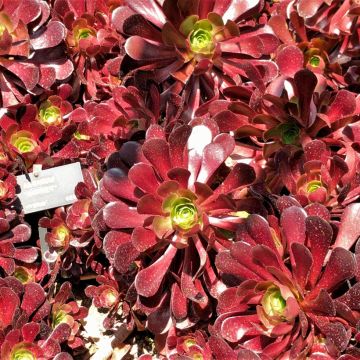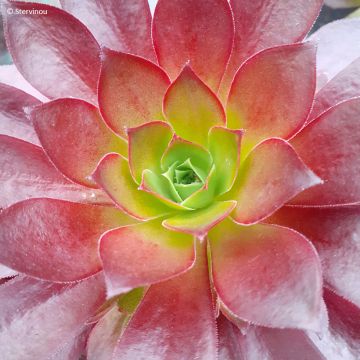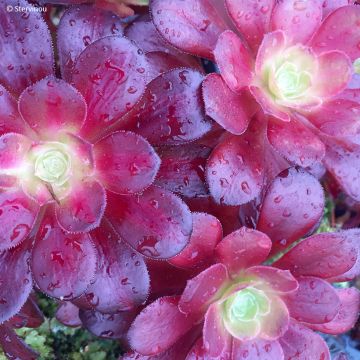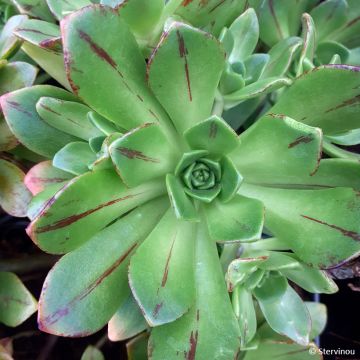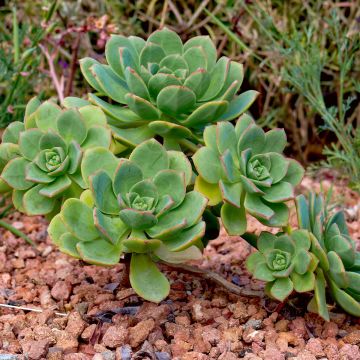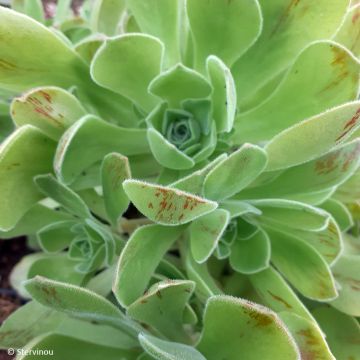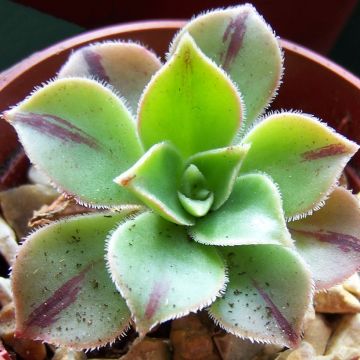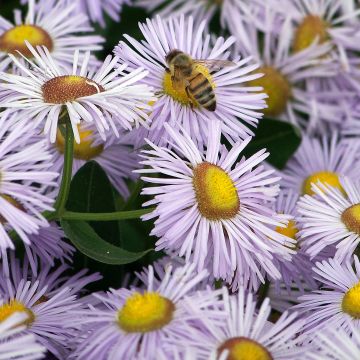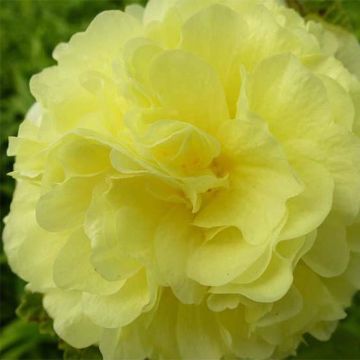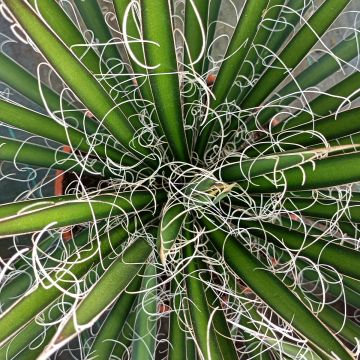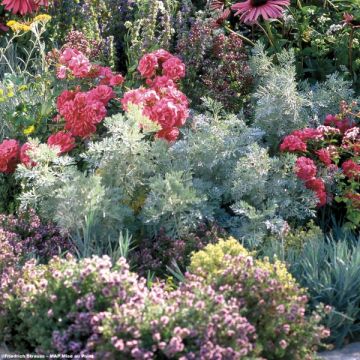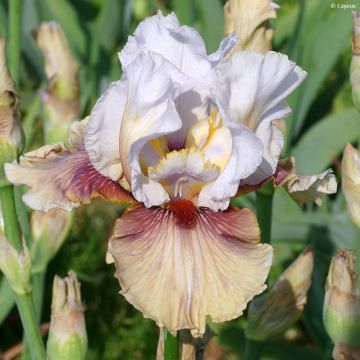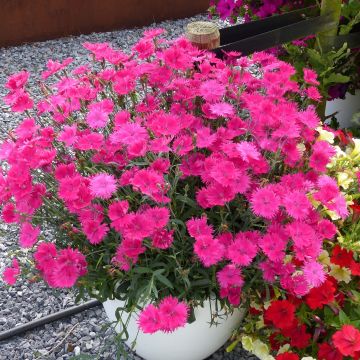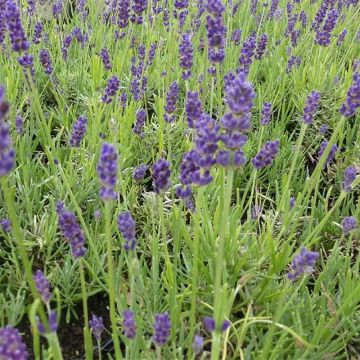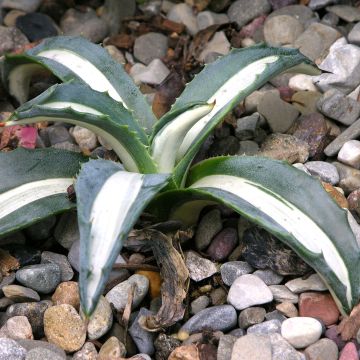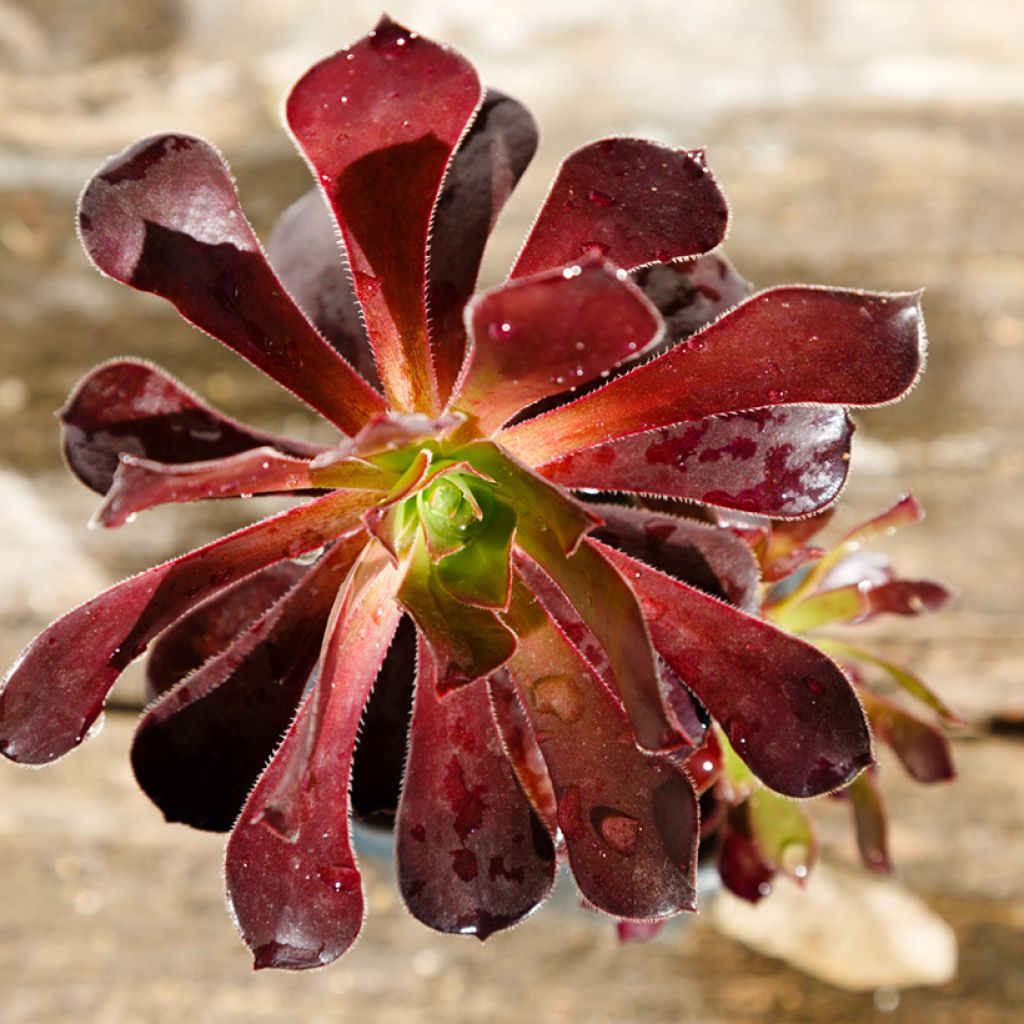

Aeonium arboreum Du rozzen - Aéonium en arbre
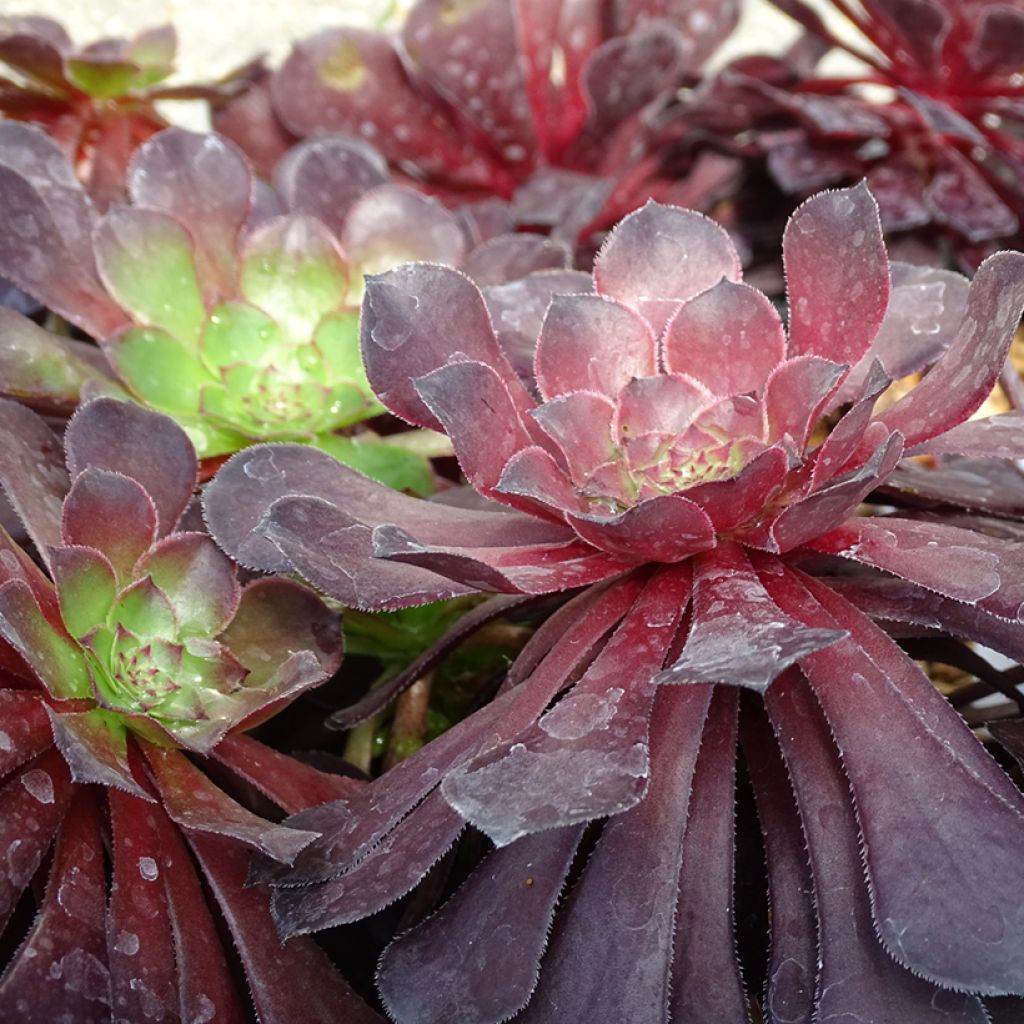

Aeonium arboreum Du Rozzen - Aéonium en arbre
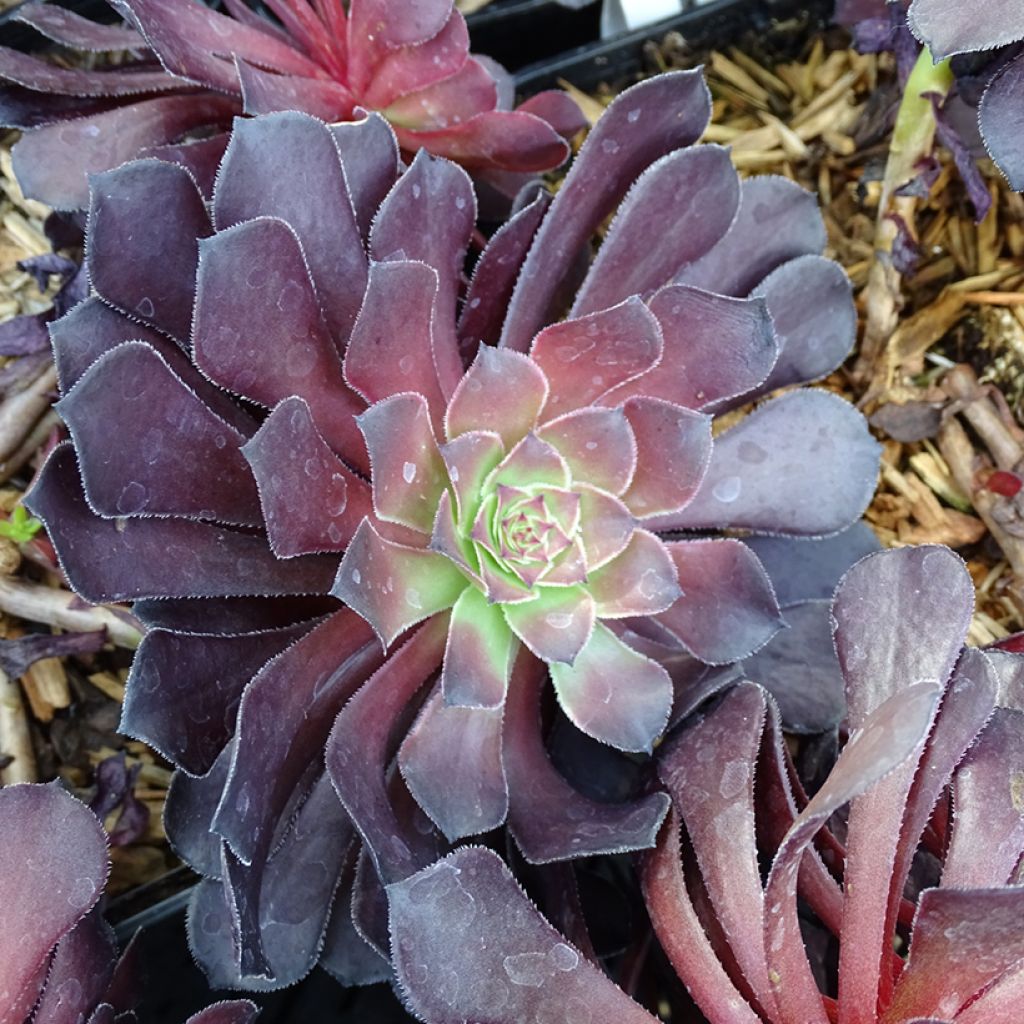

Aeonium arboreum Du Rozzen - Aéonium en arbre
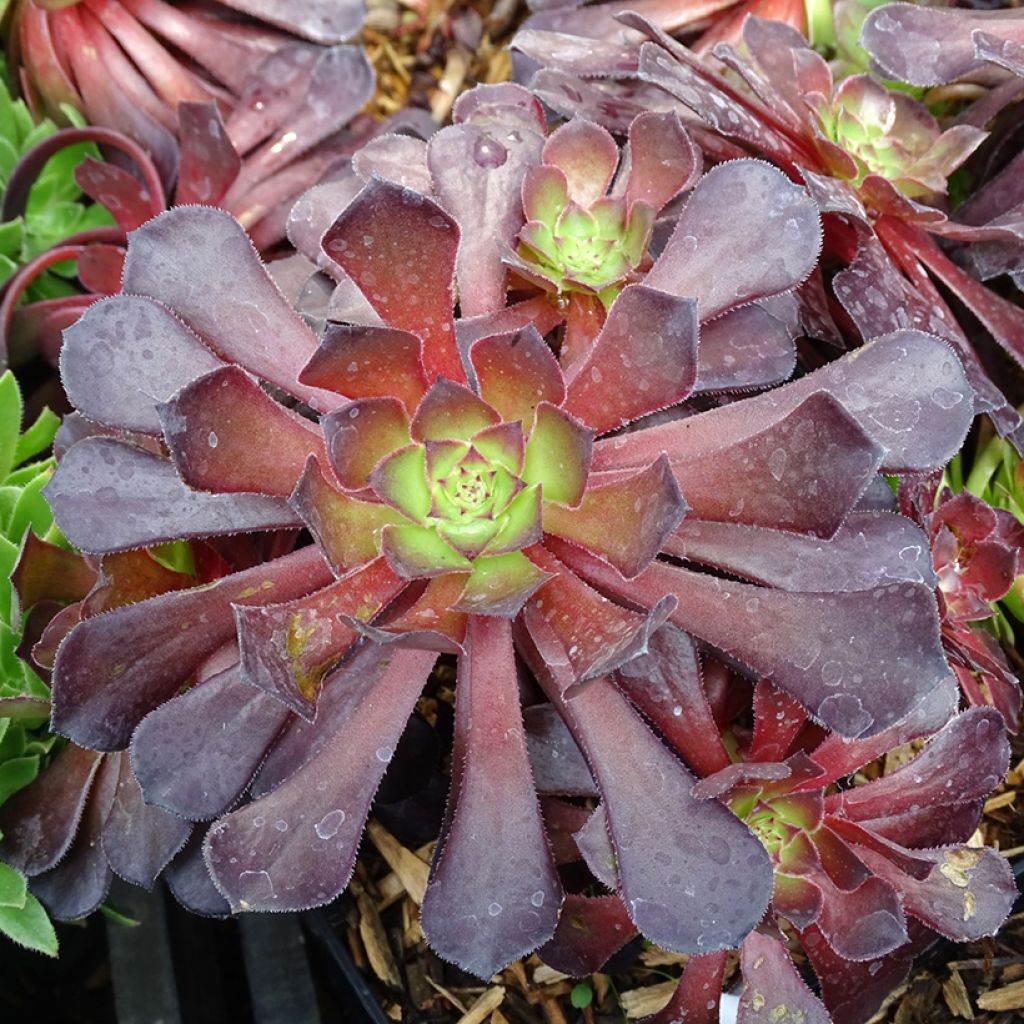

Aeonium arboreum Du Rozzen - Aéonium en arbre
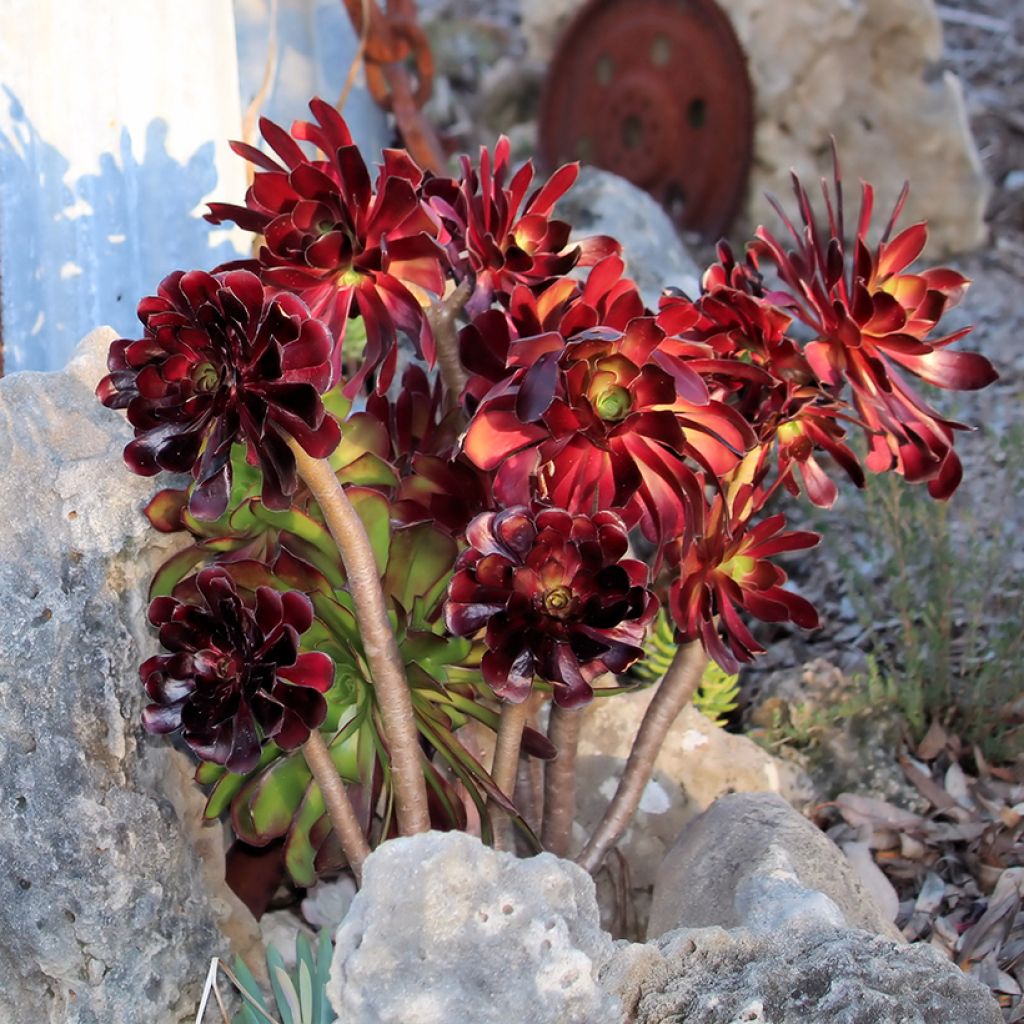

Aeonium arboreum Du rozzen - Aéonium en arbre
Aeonium arboreum Du Rozzen
Aeonium arboreum Du Rozzen
Tree Houseleek
Why not try an alternative variety in stock?
View all →This plant carries a 24 months recovery warranty
More information
We guarantee the quality of our plants for a full growing cycle, and will replace at our expense any plant that fails to recover under normal climatic and planting conditions.
From €5.90 for pickup delivery and €6.90 for home delivery
Express home delivery from €8.90.
Does this plant fit my garden?
Set up your Plantfit profile →
Description
The 'Du Rozzen' Aeonium arboreum is a particularly aesthetic hybrid, recognizable by its elongated and lanceolate leaves. This variety displays a vibrant purple colour all year round, while many others turn green in winter. This is its main asset, combined with a compact and dense habit that is very decorative thanks to the perfect geometry of its rosettes. The green heart of the rosettes creates a pleasant contrast with the surrounding dark purple, making them perfect decorative potted plants. Not very hardy, it is recommended to cultivate it in a pot to overwinter it frost-free. Highly resistant to heat and drought, it is the ideal plant for our increasingly hot summers!
Aeoniums are succulent plants belonging to the Crassulaceae family, which includes around 1500 species, many of which have ornamental value. Everyone knows the popular Kalanchoe with their bright flower bouquets that brighten up our interiors, or Echeveria that have been the stars of mosaic culture, while Sedums are essential for green roofs... We could also mention the friendly Joubarbes, or Sempervivum, which are part of our spontaneous flora despite their exotic appearance, and many others.
Aeoniums have a family resemblance that makes them easy to identify - at least as a genus, because when it comes to species or variety, it becomes more difficult. 'Du Rozzen', on the other hand, is quite easily identifiable because of the unique shape of its foliage. Its lanceolate leaves are tapered like swords, gradually widening as they move away from the base, before ending abruptly in a point. This very geometric and particularly graphic pattern contributes greatly to the grace of this hybrid. Introduced to the market in 2014 by Penberth Plants Nursery in the United Kingdom, its parents are 'Zwartkop' (or 'Schwarzkopf', a variety with almost black purple foliage that has been widely hybridized) and another Aeonium, possibly A. simsii, a small montane Aeonium. 'Du Rozzen' is also quite similar to the varieties 'Firecracker' and 'Carmen', which also have very graceful foliage.
The charm of 'Du Rozzen' is that it retains its purple colour in winter, while many other varieties turn green when sunlight is no longer sufficient. Only the heart is green, which further enhances the visual impact of the purple leaves. In addition, this small Aeonium is very compact, reaching a maximum height of 40cm (15.7in) and a width of 60cm (23.6in), but sometimes limiting itself to 30 x 30cm (11.8in), forming a superb potted plant. Not very hardy, it is indeed more prudent to cultivate it in this way, unless you have a frost-free niche situation on the French Riviera, which is never guaranteed 100%. Choose a well-draining potting soil and place your Aeonium in full sun, it only requires occasional watering in summer, making sure to let the soil completely dry out between waterings, and it will embellish your balcony or terrace throughout the summer season. Almost maintenance-free plant, except for a possible cleaning in summer to remove dead leaves: its prolific growth produces a large number of rosettes, which then compete for available space. To support its development, you can also provide slow-release fertilizer in spring.
Aeoniums form a group of succulent plants that are visually stunning with their graphic shapes and perfectly geometric, imbricate rosettes of leaves. Their low hardiness is compensated by their excellent drought tolerance, which allows them to be easily cultivated in pots, alone or in combination with other plants. In a container, you can create beautiful contrasts of shapes and colours by planting it with other graphic plants. Senecio mandraliscae, with its trailing habit and incredible silver-blue colour, will create a surprise alongside 'Du Rozzen'. Your small Aeonium can also be planted under the shelter of a veranda in a not too cold climate, where it can thrive protected from frost alongside other frost-sensitive plants. Pachypodium lamerei, which appears to be a cross between a palm tree and a baobab, will be a good companion, as it is a plant from the Oleander family, with a swollen stem topped with elongated leaves, giving it a unique and graphic appearance. Another companion could also be the famous Aloe vera, which grows very well in a veranda, forming a large clump with multiple offsets after a few years. You will appreciate having it on hand in case of burns, as its sap provides immediate relief from pain.
Report an error about the product description
Aeonium arboreum Du Rozzen in pictures
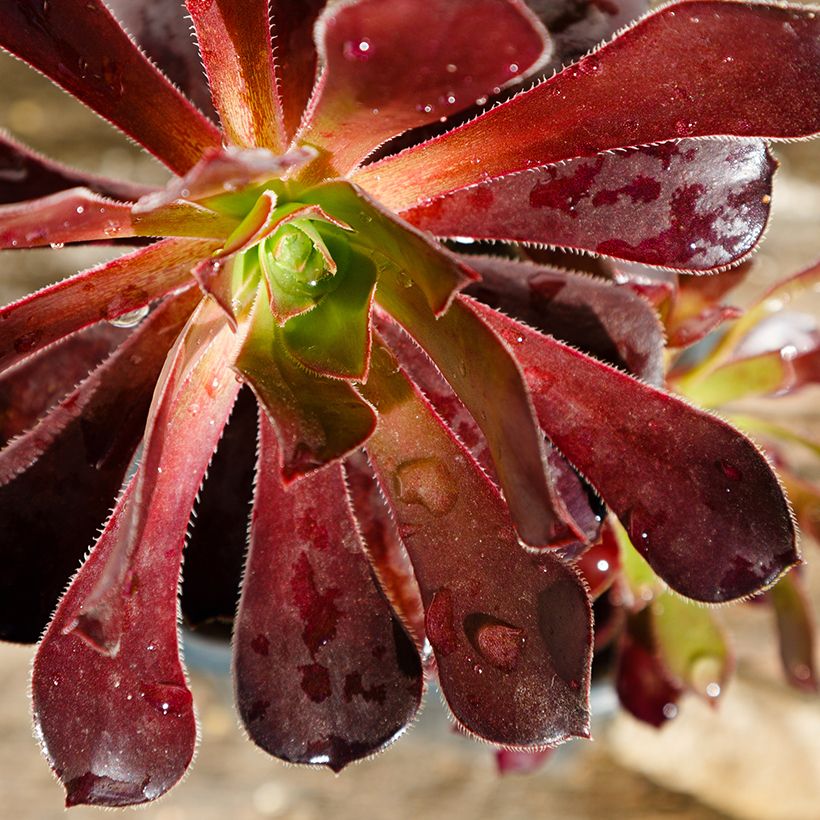

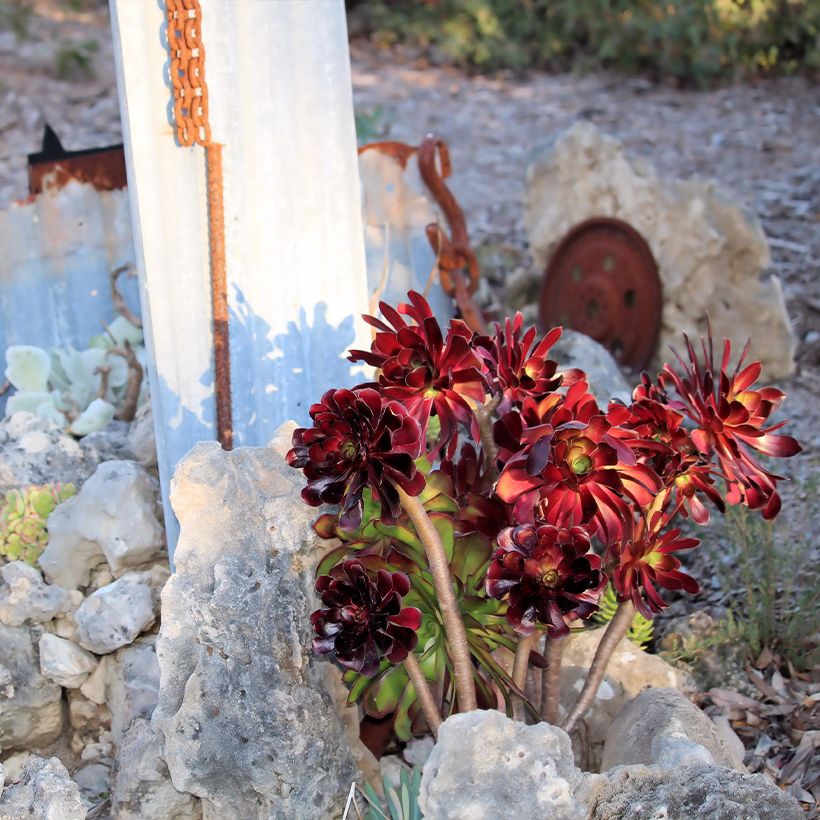

Plant habit
Foliage
Botanical data
Aeonium
arboreum
Du Rozzen
Crassulaceae
Tree Houseleek
Cultivar or hybrid
Other Aeonium
Planting and care
Aeonium arboreum 'Du Rozzen', very resistant to heat and drought, requires a light, well-drained, sandy, poor, even slightly calcareous soil. Plant it after the last frost in open ground in a hot and dry climate and in a sheltered position from the cold, to which 'Du Rozzen' is very sensitive. It is therefore preferable almost everywhere to plant it in a pot in order to overwinter it frost-free in a very bright room. Water moderately from autumn to spring, and sparingly in summer.
Planting period
Intended location
Care
This item has not been reviewed yet - be the first to leave a review about it.
Mediterranean perennials
Haven't found what you were looking for?
Hardiness is the lowest winter temperature a plant can endure without suffering serious damage or even dying. However, hardiness is affected by location (a sheltered area, such as a patio), protection (winter cover) and soil type (hardiness is improved by well-drained soil).

Photo Sharing Terms & Conditions
In order to encourage gardeners to interact and share their experiences, Promesse de fleurs offers various media enabling content to be uploaded onto its Site - in particular via the ‘Photo sharing’ module.
The User agrees to refrain from:
- Posting any content that is illegal, prejudicial, insulting, racist, inciteful to hatred, revisionist, contrary to public decency, that infringes on privacy or on the privacy rights of third parties, in particular the publicity rights of persons and goods, intellectual property rights, or the right to privacy.
- Submitting content on behalf of a third party;
- Impersonate the identity of a third party and/or publish any personal information about a third party;
In general, the User undertakes to refrain from any unethical behaviour.
All Content (in particular text, comments, files, images, photos, videos, creative works, etc.), which may be subject to property or intellectual property rights, image or other private rights, shall remain the property of the User, subject to the limited rights granted by the terms of the licence granted by Promesse de fleurs as stated below. Users are at liberty to publish or not to publish such Content on the Site, notably via the ‘Photo Sharing’ facility, and accept that this Content shall be made public and freely accessible, notably on the Internet.
Users further acknowledge, undertake to have ,and guarantee that they hold all necessary rights and permissions to publish such material on the Site, in particular with regard to the legislation in force pertaining to any privacy, property, intellectual property, image, or contractual rights, or rights of any other nature. By publishing such Content on the Site, Users acknowledge accepting full liability as publishers of the Content within the meaning of the law, and grant Promesse de fleurs, free of charge, an inclusive, worldwide licence for the said Content for the entire duration of its publication, including all reproduction, representation, up/downloading, displaying, performing, transmission, and storage rights.
Users also grant permission for their name to be linked to the Content and accept that this link may not always be made available.
By engaging in posting material, Users consent to their Content becoming automatically accessible on the Internet, in particular on other sites and/or blogs and/or web pages of the Promesse de fleurs site, including in particular social pages and the Promesse de fleurs catalogue.
Users may secure the removal of entrusted content free of charge by issuing a simple request via our contact form.
The flowering period indicated on our website applies to countries and regions located in USDA zone 8 (France, the United Kingdom, Ireland, the Netherlands, etc.)
It will vary according to where you live:
- In zones 9 to 10 (Italy, Spain, Greece, etc.), flowering will occur about 2 to 4 weeks earlier.
- In zones 6 to 7 (Germany, Poland, Slovenia, and lower mountainous regions), flowering will be delayed by 2 to 3 weeks.
- In zone 5 (Central Europe, Scandinavia), blooming will be delayed by 3 to 5 weeks.
In temperate climates, pruning of spring-flowering shrubs (forsythia, spireas, etc.) should be done just after flowering.
Pruning of summer-flowering shrubs (Indian Lilac, Perovskia, etc.) can be done in winter or spring.
In cold regions as well as with frost-sensitive plants, avoid pruning too early when severe frosts may still occur.
The planting period indicated on our website applies to countries and regions located in USDA zone 8 (France, United Kingdom, Ireland, Netherlands).
It will vary according to where you live:
- In Mediterranean zones (Marseille, Madrid, Milan, etc.), autumn and winter are the best planting periods.
- In continental zones (Strasbourg, Munich, Vienna, etc.), delay planting by 2 to 3 weeks in spring and bring it forward by 2 to 4 weeks in autumn.
- In mountainous regions (the Alps, Pyrenees, Carpathians, etc.), it is best to plant in late spring (May-June) or late summer (August-September).
The harvesting period indicated on our website applies to countries and regions in USDA zone 8 (France, England, Ireland, the Netherlands).
In colder areas (Scandinavia, Poland, Austria...) fruit and vegetable harvests are likely to be delayed by 3-4 weeks.
In warmer areas (Italy, Spain, Greece, etc.), harvesting will probably take place earlier, depending on weather conditions.
The sowing periods indicated on our website apply to countries and regions within USDA Zone 8 (France, UK, Ireland, Netherlands).
In colder areas (Scandinavia, Poland, Austria...), delay any outdoor sowing by 3-4 weeks, or sow under glass.
In warmer climes (Italy, Spain, Greece, etc.), bring outdoor sowing forward by a few weeks.

































